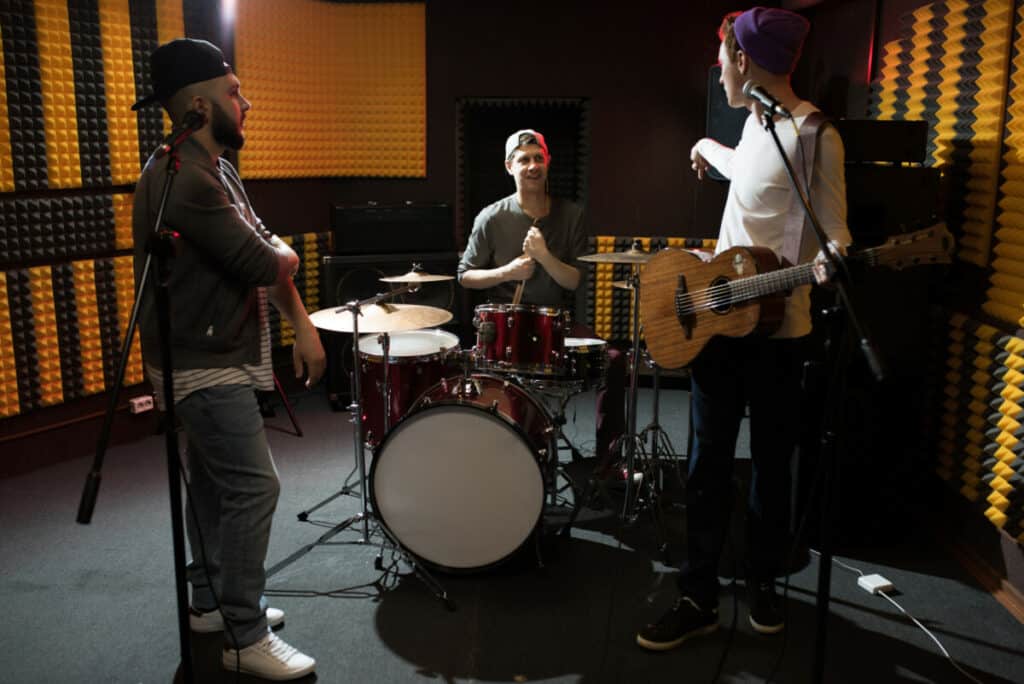This post contains affiliate links. We earn commissions if you purchase products from retailers after clicking on a link from our site. As an Amazon Associate, we earn from qualifying purchases.
If you’ve ever considered becoming a professional musician, you might wonder what it takes on a weekly basis. I asked 100 musicians how many hours they practice outside performing, and this is the answer I got:
On average, most professional musicians practice from 1 to 3 hours a week. However, the number of hours practiced each week depends on factors such as the type of music played, the instrument, and the musician’s goals.
| Hours per week of practice (Excluding Performing) | Respondents | Percentage |
|---|---|---|
| 1-3 | 40 | 40.18% |
| 4-7 | 21 | 19.64% |
| 7-10 | 19 | 17.86% |
| 11-14 | 4 | 3.57% |
| 0-1 | 9 | 9.82% |
| 15-20 | 5 | 8.93% |
How many hours do you practice a week? (outside performing)
By the way, looking for recording equipment and musical instruments? Check out Sweetwater.com for microphones, monitors, audio interface or any other recording gear that you could ever need. (Affiliate Link)
The thing is, that the answer is a bit more complicated than that. I asked this question of different groups of musicians, and it turns out the type of instrument you choose can determine how much practice you’ll have to do.

Read on for more details:
How Many Hours Do Pro Musicians Practice?
So, I gave you all the numbers above, but I asked a lot of different types of musicians, and I noticed that the number of hours practiced per week was very different depending on the instrument.
Let’s give you some more data.
How Many Hours Per Week Do Drummers Practice?
| Hours per week of practice For Drummers (Excluding Performing) | Respondents | Percentage |
|---|---|---|
| 1-3 | 34 | 41.46% |
| 4-7 | 20 | 24.39% |
| 7-10 | 13 | 15.85% |
| 11-14 | 4 | 4.88% |
| 0-1 | 7 | 8.54% |
| 15-20 | 4 | 4.88% |
How Many Hours Per Week Do Guitarists Practice?
| Hours per week of practice For Guitarists (Excluding Performing) | Respondents | Percentage |
|---|---|---|
| 1-3 | 6 | 40.00% |
| 4-7 | 1 | 6.67% |
| 7-10 | 6 | 40.00% |
| 11-14 | 0 | 0 |
| 0-1 | 2 | 13.33% |
| 15-20 | 1 | 6.67% |
How Many Hours Per Week Do Bongoceros Practice?
| Hours per week of practice For Bongoceros (Excluding Performing) | Respondents | Percentage |
|---|---|---|
| 1-3 | 5 | 34% |
| 4-7 | 1 | 6% |
| 7-10 | 1 | 6% |
| 11-14 | 0 | 0% |
| 0-1 | 2 | 14% |
| 15-20 | 5 | 34% |
Why Do Some Musicians Practice More Than Others?
The simple answer is some professional musicians don’t practice too much because they’re too busy performing! There is some more to it, though.
Music is built up out of patterns. The patterns can be very complex, but they are patterns nonetheless.
The patterns change with the genre of music. Death metal has things that happen, Salsa music has things that happen, and Pop music has things that happen.
Furthermore, instruments in a genre follow patterns.
After all, music is really just well-timed scales and chords along with a rhythm from a collection of instruments.
Once You Learn The Patterns, You Can Just Perform
It’s likely that drummers as a whole practice less than other types of musicians. It’s not because what they are doing is easy, but because the drum patterns in music are more consistent from song to song drummers don’t need to practice as much because they know the patterns and can stitch them together.
For example, a drummer may be able to use the same exact drum beat for 1000 different songs, with the variation coming in with the kicks and the drum fills.
A lead guitarist in contrast has to learn the specific melodies for different songs. While songs usually follow chord progressions with different scales, the melodies have rhythms and melodies that are specific to that song.
A professional lead guitarist may need to rehearse their songs more than a drummer needs to.
Eventually, professional musicians only need to rehearse their songs with their band–they can play whatever is thrown at them, and all that evens out.
Some musicians, depending on the genre and their particular gig may only need to practice 0-1 hours per week.
Now, that can be vastly different from drummer to drummer, and from music style to music style.
Mastery Is Not Everyone’s Goal
Another thing to remember is that some musicians are not interested in becoming masters of their instrument but love playing with a band, or it’s become just another job. Mastery requires continued practice and playing songs or concepts that are uncomfortable.
Not everyone has the goal of mastery once they’ve reached a certain level of proficiency. This applies to my day job. A lot of people arrive at a certain level of mastery and they are content. In my opinion, there’s nothing wrong with that.
How Many Hours A Week Should You Practice?
If you want to play professionally, you will likely need to put in 14-20 hours of practice a week. If you want to play competently as a hobbyist, then you will need 5-6 hours of practice a week.
If you aren’t yet a professional and want to be, someday, then your week is going to look a lot different than a professional musician. Instead of spending hours performing, you’re spending hours practicing!
If you’re a student in a music program (especially a performance program), then you’ll definitely be spending gobs of time practicing various challenging music pieces that you’ll be tested on.
This type of practice is different than professionals because once you reach a certain level of proficiency where you are performing regularly, you don’t need to spend hours and hours memorizing a piece so that you get it perfectly–you can sight read or perhaps you even can play it after running through it a few times.
If you’re a set player, the only experience you may have with a song is that you may have heard it a few times–all you may get is a chord chart, and you just make up your own transitions. As a student musician, you’d have to practice each song extensively–but as a pro, you’ve already put in those hours and all you need to do is run through it with your band a few times.
My Experience Playing Alongside a Pro Musician
My company used to have a band–cool right? They would play two sets a year at a few concerts and spend several months practicing in between each one.
At every performance, the band director would ask the Navy band members to come to supplement our band. We were just volunteer band members who only practiced with each other and a few hours during the week. But the pros?
I played next to a Navy trumpet player and she would show up to the dress rehearsal and be able to play all the songs without having to have gone to all the other practice sessions. She was just able to figure out the music and transitions without having to have gone over them dozens of times with the rest of the band.
That’s the difference. So while she wasn’t a virtuoso–she wasn’t practicing 4 hours a day anymore–she was proficient enough to handle the style of music and pieces without having to put in the same hours of practice the rest of the band had to.
